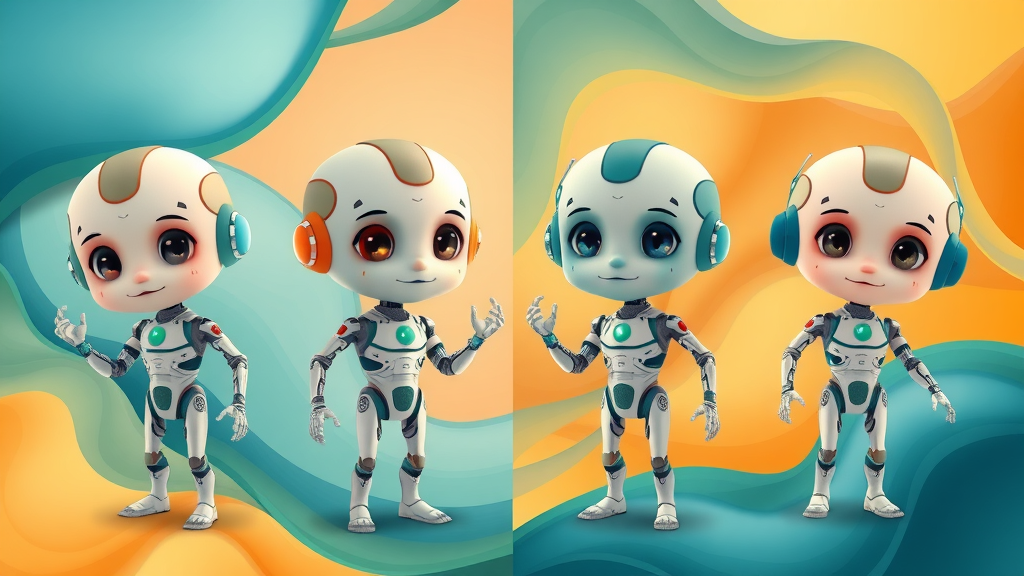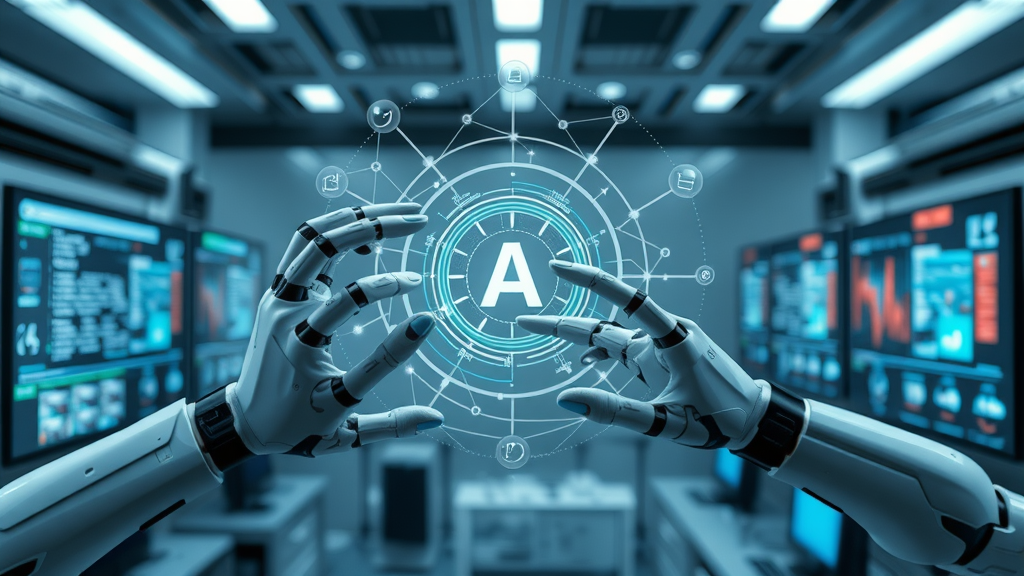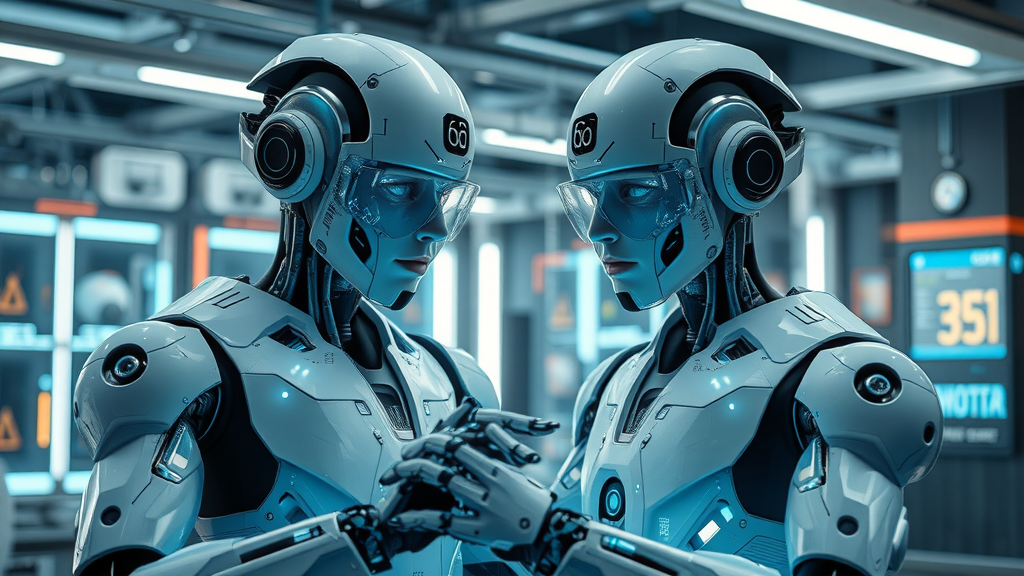Did you know that over 77% of devices we use every day run on artificial intelligence (AI) technology, often working quietly in the background without us even realizing it? From voice assistants at home to smart cameras in our pockets, AI tech has woven itself into almost every part of daily life. In this guide, we unveil the secrets, innovations, and impact of artificial intelligence, showing you just how powerful and present this technology truly is.
Unveiling Artificial Intelligence (AI) Technology: Startling Facts and the Modern Landscape
"Recent studies reveal that over 77% of devices we use daily are powered by some form of artificial intelligence (AI) technology, often operating behind the scenes without our awareness."

Artificial intelligence (AI) technology is not just about robots or science fiction. In reality, AI is all around us, helping complete tasks, optimizing our home appliances, managing our online searches, and even recommending which movies to watch next. As AI systems grow smarter and more capable, they are transforming industries like healthcare, finance, education, and transportation. Today, AI applications cover a wide range of uses, from assisting doctors with diagnoses to enabling self-driving cars. Whether we notice it or not, AI continually learns and evolves, driving innovation and delivering capabilities that were once thought impossible.
With the rapid growth of AI tech, companies are racing to integrate smart solutions into their products and services. Machine learning, neural networks, and deep learning models are at the heart of this revolution. These core technologies help computers mimic human intelligence by recognizing patterns in data, understanding natural language, and making decisions in real time. AI is quickly becoming an essential part of nearly every industry, and it’s just getting started.
What You'll Learn About Artificial Intelligence (AI) Technology
Gain a clear understanding of artificial intelligence (AI) technology fundamentals.
Explore core concepts like neural networks, machine learning, and deep learning.
Discover current and future applications of AI tech and its implications across industries.
Learn practical steps for integrating AI solutions into specific tasks.
Examine ethical concerns and ongoing debates around AI technology.
Artificial Intelligence (AI) Technology: Definition, History, and Core Concepts
Defining Artificial Intelligence (AI) Technology and Its Core Capabilities
Artificial intelligence (AI) technology refers to the science and engineering of creating machines and computer programs that can perform tasks requiring human-like intelligence. At its heart, AI includes technologies like machine learning, neural networks, and deep learning, all working together to let systems analyze information, recognize patterns, and make smart decisions. Unlike traditional computer systems that follow exact instructions, AI systems adapt and learn from data, improving their performance over time. Core capabilities of AI tech include problem-solving, speech recognition, computer vision, and natural language processing. These skills make it possible for AI apps to understand spoken commands, translate languages, and even create new content, just like the latest generative AI tools.
Thanks to the advances in computing power and the availability of massive datasets, AI technology has become more efficient, powerful, and accessible than ever before. Whether it's a recommendation engine suggesting what song you might like, or a chatbot answering your customer service queries, AI systems are quietly running in the background, making life easier and more efficient. The key differentiator of AI is its ability to learn and adapt to new situations (often through machine learning models and algorithms), setting it apart from standard computer software.
Tracing the Evolution of Artificial Intelligence: Key Milestones, Trends, and Influences

The journey of artificial intelligence began in the 1950s, when computer scientists started exploring how machines could mimic human thinking. Visionaries like Alan Turing proposed foundational questions about "machinery and intelligence," while the Turing Test became a benchmark for evaluating machine intelligence. Over the decades, AI science evolved through several waves: early symbolic AI, rule-based systems, and, later, the rise of neural nets and machine learning. Breakthroughs such as deep learning and natural language processing have allowed computers to understand human language, interpret images through computer vision, and recognize speech.
Each era of AI tech introduced new possibilities and challenges. The 1980s saw the introduction of deep neural nets and rudimentary expert systems. In the 2000s, greater computational power and big data fueled rapid progress, making applications like self-driving cars and real-time translation possible. Today, AI technology is advancing faster than ever, shaping how we communicate, work, and solve problems. By understanding these pivotal milestones, we can better appreciate the everyday AI apps and tools that are now part of our lives.
From Symbolic AI to Machine Learning and Neural Networks
In the early days, symbolic AI (sometimes called "good old-fashioned AI") relied on clear rules and symbolic logic to make decisions, a bit like following a recipe step by step. While useful for certain tasks, symbolic AI struggled with the complexities and ambiguity found in the real world. The introduction of machine learning marked a dramatic shift for artificial intelligence. Instead of hardcoding every rule, machine learning lets AI systems learn from examples, finding patterns in data and making predictions. Neural networks and deep learning further expanded AI’s power by mimicking how the human brain works, allowing computers to understand images, speech, and even emotions.
These advances have led to a new generation of AI tools, applications, and platforms. Today, deep neural nets handle everything from recognizing faces in photos to powering conversational chatbots in customer support. The future promises even more, with ongoing research into general intelligence, where AI may one day reason and adapt in ways similar to humans. These developments have paved the way for AI to transform our world, industry by industry.
Milestones in Artificial Intelligence (AI) Technology Development |
Year |
Key Innovators |
Major Breakthroughs |
|---|---|---|---|
Creation of the Turing Test |
1950 |
Alan Turing |
Set a benchmark for machine intelligence |
First AI programs (Logic Theorist, General Problem Solver) |
1956-1959 |
Allen Newell, Herbert Simon, John McCarthy |
Birth of symbolic AI |
Development of expert systems |
1970s-1980s |
Multiple research groups |
Rule-based reasoning |
Emergence of machine learning and neural networks |
1980s-1990s |
Geoffrey Hinton, Yann LeCun |
Backpropagation, deep neural net |
Breakthrough in deep learning and natural language processing |
2000s-2010s |
Google, OpenAI, DeepMind |
Image recognition, speech recognition, and language models |
How Artificial Intelligence (AI) Technology Works: The Science Behind AI
The Role of Machine Learning in Artificial Intelligence (AI) Technology

At its core, machine learning is the engine that powers modern AI tech. Instead of following explicit instructions, machine learning models are trained to find patterns in data, allowing them to make predictions, spot anomalies, or solve specific tasks. Whether it’s identifying objects in an image or filtering spam emails, machine learning algorithms learn from examples and improve over time. This ability to learn from data makes AI systems flexible, adaptive, and scalable to a wide range of problems.
These models come in different forms, including supervised learning (where a model is trained with labeled data), unsupervised learning (for unlabeled data), and reinforcement learning (learning by trial and error). Cutting-edge AI apps often use ensemble strategies, combining multiple models to solve complex challenges. As AI researchers continue to innovate, machine learning remains a cornerstone technology, driving advancements in everything from recommendation engines to advanced prediction tools in finance and healthcare.
Understanding Neural Networks and Deep Learning in AI Tech
Neural networks form the backbone of deep learning, a subset of machine learning that models the way our brains process information. A neural network is made up of interconnected nodes, or "neurons," arranged in layers. When data flows through this network, each node processes information and passes it along, letting the system make sense of complex patterns like distinguishing cats from dogs in photos or understanding spoken words. Deep neural nets, which have many hidden layers, can tackle incredibly challenging tasks that were once out of reach for computers.
Today, deep learning powers some of the most advanced AI applications. AI systems trained using neural networks can perform speech recognition, computer vision, and language processing tasks at a level close to, or sometimes surpassing, human experts. With enough data and training, these networks can write text, generate new images using generative AI, or even compose music. Because neural networks adapt based on experience, they are fueling new generations of AI tools that keep getting smarter with every interaction.
Natural Language Processing and Computer Vision Applications

Two of the most visible breakthroughs in artificial intelligence (AI) technology are natural language processing (NLP) and computer vision. NLP lets computers understand and respond to human language, making it possible for AI-powered chatbots, translators, and voice assistants to interact naturally with people. AI tools for NLP use huge datasets and advanced algorithms to translate, summarize, or even generate text that sounds like it was written by a human.
Computer vision, on the other hand, teaches AI systems to interpret images and video everything from smartphone cameras to self-driving cars identify objects, people, and situations. By combining machine learning, deep learning, and neural networks, modern AI tech can read emotions, spot trends in customer behavior, or flag errors in manufacturing lines. These technologies are revolutionizing industries by automating everyday tasks once thought to require uniquely human intelligence.
Generative AI: Creativity and Content Creation
Generative AI brings a new level of creativity to artificial intelligence (AI) technology. Unlike traditional AI, which focuses on analyzing data or recognizing patterns, generative AI creates brand-new content from scratch. It can produce text, music, artwork, and even code. Using advanced neural networks called generative adversarial networks (GANs) or large language models, these AI systems are able to compose poems, generate hyper-realistic images, and help companies design products faster.
This leap in creative ability has far-reaching applications. For example, marketers use generative AI to write ad copy, graphic designers collaborate with AI to generate unique visuals, and app developers leverage it to create code templates. As this technology continues to evolve, it allows anyone to enhance their creative process, opening new doors for innovation across every industry.
The Four Types of Artificial Intelligence (AI) Technology
Reactive Machines
Limited Memory
Theory of Mind
Self-aware AI

How Each AI Type Impacts AI Applications and Everyday Life
Each type of artificial intelligence (AI) technology brings unique capabilities and impacts. Reactive Machines are the simplest, acting only on current inputs without memory or learning capabilities. Deep Blue, IBM's chess-playing computer, is a classic example. Limited Memory AIs learn from past experiences, like self-driving cars using data from previous journeys to improve safety decisions. Theory of Mind AI, still largely experimental, aims to understand emotions, intentions, and beliefs, paving the way for truly adaptive and interactive AI applications. Finally, Self-aware AI would possess consciousness and self-understanding, but this remains theoretical and is a topic of ongoing research and debate.
Today’s AI tech mainly falls into the first two categories: reactive and limited memory. From voice assistants that remember your preferences to recommendation engines that adapt to your habits, these AI systems are already making life easier. As research progresses, the goal is to create AI apps capable of more profound empathy and reasoning, leading to smarter, more intuitive user experiences.
Type of Artificial Intelligence |
Capabilities |
Real-World Examples |
|---|---|---|
Reactive Machines |
Responds to situations with pre-defined rules. No memory or learning. |
IBM Deep Blue chess computer, basic chatbots |
Limited Memory |
Remembers past data to inform decisions. Can learn from historical information. |
Self-driving cars, recommendation systems, and voice assistants |
Theory of Mind |
Under development. Can interpret emotional cues and social signals. |
Experimental social robots, future adaptive AI therapy apps |
Self-aware AI |
Possesses consciousness and self-reflection abilities (purely theoretical). |
None; still an active area of research |
People Also Ask: What are Artificial Intelligence Technologies?
Answer: Artificial intelligence technologies are systems and software that can perform tasks that typically require human intelligence, such as decision-making, natural language understanding, computer vision, and more.
Major Components of Artificial Intelligence (AI) Technology
Machine Learning, Deep Learning, and Neural Networks
Machine learning is the main component driving modern AI tech, enabling AI tools to learn from data and find patterns to solve a wide range of problems. Deep learning is a special branch of machine learning using deep neural networks, layers of interconnected nodes to process information and perform complex tasks like recognizing faces or interpreting speech. These neural networks are inspired by the structure of the human brain, allowing AI systems to learn and adapt with experience. As a result, today’s AI apps use these models in applications ranging from self-driving cars to smart personal assistants.
Together, machine learning, deep learning, and neural networks give artificial intelligence the flexibility to tackle specific tasks and generalize from previous examples. Whether it’s sorting photos, diagnosing health conditions, or powering recommendation engines, these technologies underpin the AI advances we see every day.
Natural Language Processing, Speech Recognition, and Language Processing
Key Terms: algorithm, model, dataset, training, inference

Natural language processing (NLP) enables AI systems to understand, interpret, and respond to human language. By processing large datasets of text, these technologies power real-time translations, chatbots, and virtual assistants that can hold conversations with users. Speech recognition is closely linked, letting AI convert spoken language into written text, making hands-free communication and voice commands possible. These language processing features are essential for many AI applications, helping bridge the gap between human communication and computer systems.
Behind the scenes, these components use algorithms and models trained on vast datasets. Training refers to the process of teaching the model how to perform its task using example data, while inference is when the model applies what it has learned to new, unseen data. By combining these elements, AI apps can process and generate human language at scale.
People Also Ask: What are the 4 Types of Artificial Intelligence?
Answer: The four types include Reactive Machines, Limited Memory, Theory of Mind, and Self-Aware AI, each representing increasing complexity in artificial intelligence (AI) technology.
Practical Artificial Intelligence (AI) Technology in Action: AI Tech Applications
AI Applications Transforming Business: Case Studies and Examples
AI technology is driving major innovation in business. Leading companies use AI systems to streamline logistics, improve customer service, and detect fraud. For example, retailers use neural networks and deep learning models to predict demand and personalize product recommendations. Banks deploy machine learning algorithms for real-time fraud prevention, while e-commerce giants use AI to optimize supply chains and boost efficiency. AI tools help analyze massive amounts of data quickly, letting organizations respond faster to market changes. By automating repetitive tasks, businesses can focus on strategic decisions and innovative solutions, paving the way for growth and success.
Every day, new AI applications emerge. AI-powered chatbots handle customer inquiries 24/7, and advanced analytics help companies make smarter marketing decisions. The business advantages are clear: organizations that invest in AI tech often gain a competitive edge, cost savings, and improved customer satisfaction. It’s no wonder so many industries are making artificial intelligence a core part of their strategy.
AI in Healthcare: Computer Vision and Natural Language Processing for Patient Outcomes

In healthcare, artificial intelligence (AI) technology is transforming how doctors diagnose and treat patients. Computer vision systems can analyze medical images, such as X-rays and MRIs, spotting abnormalities faster and with greater accuracy than traditional methods. Natural language processing enables doctors and nurses to quickly review patient records, summarize notes, and suggest clinical decisions based on up-to-date information. With machine learning, AI systems can predict patient health risks, personalize treatment plans, and improve overall care outcomes.
By automating manual tasks and analyzing large amounts of medical data, AI applications save valuable time for healthcare professionals and help reduce errors. The result is better diagnostics, improved workflow, and more efficient care, ultimately leading to healthier patients. As AI tech continues to evolve, it promises to make healthcare more accessible and precise for everyone.
AI in Finance: Predictive Models Using Machine Learning and Deep Learning

Artificial intelligence is revolutionizing the finance industry. Banks and investment firms rely on predictive models powered by machine learning and deep learning to analyze market trends, detect financial fraud, and automate trading. AI tech can scan thousands of data points in real time, flagging unusual patterns and helping analysts make faster, more informed investment decisions. From credit scoring to loan approval, AI tools evaluate risk with greater accuracy than ever before.
With the integration of deep neural networks, AI applications can process historical data and economic signals to forecast stock prices and identify growth opportunities. These AI-driven technologies are not only making financial markets more efficient but also more secure, by reducing human error and providing continuous monitoring against threats.
Everyday AI: From Voice Assistants to Smart Devices
The impact of artificial intelligence (AI) technology is evident in everyday life. Virtual assistants like Siri, Alexa, and Google Assistant use natural language processing to answer questions, send messages, and control smart devices. AI is at work in photo apps that recognize faces, cars that help you park, and streaming platforms that suggest movies tailored to your taste. By making daily routines simpler and more connected, AI systems are becoming trusted companions, anticipating needs and helping users get things done efficiently.
With each interaction, these AI apps get smarter. As smart home devices, wearable fitness trackers, and voice-controlled gadgets grow in popularity, AI-powered technology continues to shape the way we live, work, and play.
AI Apps and Platforms: Evolving Solutions for Specific Tasks
"Artificial intelligence is reshaping our world faster than any technology before it," says Dr. Simone Grewal, AI Researcher.
The world of AI apps and platforms is growing rapidly, offering tailored solutions for businesses and consumers alike. New AI tools are built every day to tackle specific tasks from chatbots that provide instant support, to smart scheduling assistants that automate meetings, to advanced analytics dashboards that reveal business trends. These AI applications are available as cloud services, mobile apps, and embedded in hardware, giving organizations and individuals an easy way to unlock the power of artificial intelligence.
As developers experiment with generative AI and powerful machine learning models, there’s a surge in innovative AI systems that simplify workflows and drive creative breakthroughs. By choosing the right AI app or platform, anyone can supercharge productivity and unlock new insights.
People Also Ask: Who Built AI Technology?
Answer: Artificial intelligence (AI) technology is a result of contributions from many innovators and researchers, including Alan Turing, John McCarthy, and key AI research groups at universities and tech companies worldwide.
Challenges and Ethical Considerations with Artificial Intelligence (AI) Technology
AI Ethics, Bias, and Social Impact

As AI tech becomes more powerful, questions about ethics and social impact are increasingly important. AI systems are only as fair as the data they’re trained on, which means biases can enter models and cause unintended consequences, especially in hiring, lending, or law enforcement. Issues such as transparency, accountability, and fairness in AI applications have prompted calls for clearer rules and guidelines. Developers must consider who benefits and who might be left behind when designing new AI tools.
Ensuring responsible AI means designing technology that is transparent about how decisions are made, actively monitors for bias, and respects human rights. The ongoing debate about the role of AI in society continues to shape policy and best practices so everyone can benefit from these innovations.
Security Concerns and Data Privacy in AI Tech
With greater power comes greater responsibility, especially when it comes to personal information. AI applications rely on massive datasets, raising concerns about how data is gathered, stored, and used. Protecting privacy, preventing data breaches, and ensuring that AI systems comply with legal standards is crucial for building user trust. Cybersecurity risks can arise if AI systems are not carefully managed or if attackers exploit vulnerabilities in machine learning models.
Developing secure and private AI tech requires constant vigilance. Organizations must implement robust controls, encryption, and regular audits to safeguard sensitive information. As AI continues to expand, strong security and ethical practices will remain essential.
People Also Ask: What is an AI Example?
Answer: Examples of artificial intelligence (AI) technology include virtual assistants like Siri, image recognition in photo apps, chatbots, self-driving cars, and recommendation engines on streaming platforms.
Innovations and Future Trends in Artificial Intelligence (AI) Technology
Advances in Generative AI, Machine Learning, and Neural Networks

The future of artificial intelligence (AI) technology is brimming with exciting opportunities. Generative AI is set to transform creative fields, while deep learning and neural networks continue to unlock new possibilities in data analysis and automation. Researchers are working on AI systems that can reason, imagine, and even collaborate with people on complex projects. Machine learning algorithms will become even more adaptive, providing smarter, more intuitive solutions for specific tasks.
As technology grows, we can expect AI tools to move from standalone applications to more integrated, seamless experiences, empowering people in all walks of life and democratizing access to advanced capabilities. The next decade will see breakthroughs we can hardly imagine today.
Artificial Intelligence (AI) Technology in Robotics, IoT, and Emerging Sectors
The next wave of artificial intelligence is coming to robotics, the Internet of Things (IoT), and sectors we never thought possible. In robotics, AI systems let machines move, see, and make decisions on their own, whether it’s a robot vacuum learning your home layout or collaborative robots (cobots) assisting in factories. IoT devices, from fitness trackers to smart appliances, use AI tech to anticipate needs and respond intelligently.
Emerging industries like agriculture, climate science, and education are also embracing AI, using data-driven insights to boost productivity and solve real-world challenges. The pace of these innovations suggests a future where AI is woven into the fabric of daily life, making technology more personal, helpful, and efficient than ever.
Key Takeaways on Artificial Intelligence (AI) Technology
Artificial intelligence (AI) technology is driving rapid change across global industries.
Machine learning, neural networks, and deep learning are fundamental to AI advancement.
Real-world applications range from healthcare AI to everyday smart devices.
Ethical practices are central to the responsible development of AI tech.
FAQs About Artificial Intelligence (AI) Technology
What is the difference between machine learning and deep learning?
Machine learning uses algorithms to find patterns and learn from data. Deep learning is a special type of machine learning that uses deep neural networks with many layers of interconnected “neurons” and can solve very complex problems, like image or voice recognition.How does natural language processing enable chatbot communication?
Natural language processing (NLP) lets chatbots understand, process, and respond to human language in real time. By analyzing words, grammar, and intent, NLP-powered AI can answer questions, solve problems, and hold conversations that feel natural.Can small businesses leverage artificial intelligence (AI) technology?
Yes. Many AI tools are now affordable and easy to use for small businesses, from automating customer support with AI chatbots to analyzing sales data and improving marketing strategies. AI tech helps small companies save time and make smarter decisions.Are there risks associated with AI applications?
Like any powerful technology, AI comes with risks. These include data privacy concerns, the potential for biased decisions, and cybersecurity threats if systems are not properly secured. Responsible use and constant monitoring help reduce these risks.
Conclusion: Embracing Artificial Intelligence (AI) Technology for a Smarter Future
"To harness the true power of artificial intelligence, it is essential for individuals and organizations to understand its potential and limitations."
Artificial intelligence (AI) technology is shaping a brighter, more connected tomorrow everyone willing to learn, adapt, and innovate.
A visually engaging, professionally narrated video outlining the fundamentals, history, and real-world applications of Artificial Intelligence (AI) Technology, featuring clear animations, graphics, and illustrative examples relevant to the blog's content.
Get Expert Guidance on Artificial Intelligence (AI) Technology
The Daro Digital Team hopes this article has been interesting and valuable to you. Do you have any questions or would you like us to help your company with Local Marketing and becoming a Trusted Topical Authority in your industry? Send us an email: info@darodigitalmedia.com or schedule a call with us at https://talkwithrob.com
Sources
Wikipedia: Artificial Intelligence – https://en.wikipedia.org/wiki/Artificial_intelligence
Nature AI Collection – https://www.nature.com/collections/afhiediecd
The Alan Turing Institute – https://www.turing.ac.uk/research/research-programmes/ai
Artificial intelligence (AI) technology has seamlessly integrated into our daily lives, often operating behind the scenes to enhance efficiency and decision-making. For a comprehensive understanding of AI’s definition, examples, types, applications, and key facts, consider exploring the article “Artificial intelligence (AI) | Definition, Examples, Types, Applications, Companies, & Facts.” This resource delves into the core concepts and real-world applications of AI, providing valuable insights into its pervasive role in modern society.
Additionally, for a detailed exploration of AI’s capabilities, including learning, reasoning, problem-solving, perception, and decision-making, the Wikipedia article “Artificial intelligence” offers an in-depth overview. This source covers the history, techniques, and various applications of AI, enriching your understanding of how AI systems function and their impact across different sectors.
If you’re serious about grasping the full scope of artificial intelligence technology, these resources will provide you with a solid foundation and deeper insights into its transformative potential.
 Add Row
Add Row  Add
Add 



